
VOTE sign. (Photo: Wikipedia)
56% of Californians Vote Against Proposition 16
Proposition 209 approves in voting once again, ban on Affirmative Action remains in place in California
By Evan Symon, November 4, 2020 6:37 pm
On Tuesday, voters across California voted against Proposition 16, continuing the ban on affirmative action in California
As of 5:00 PM Wednesday, No votes have tallied 56% against Prop 16 with over 71% of the vote counted, creating what political analysts see as an insurmountable lead.
An affirmative action ban has been enforced in California since the passage of Proposition 209 by a 55% to 45% vote in 1996. Since then there have been numerous attempts to overturn Prop 209, including a proposition in 2014. Despite the past failures, ACA 5, authored by Assemblywoman Shirley Weber (D-San Diego), was passed by the California legislature earlier this year, putting affirmative action once again on the ballot.
While initially popular with voters because of the Proposition’s perceived equality measures by race being a factor in state university and governmental job selection in the wake of the George Floyd protests and riots, support quickly turned against Prop 16 in the last few months. Accusations of Prop 16 being ignorant of other races, criticism of some selections not being grade or merit based, and a backlash against identity politics in California swung voters towards the No camp. Other incidents, such as Assemblywoman Christina Garcia (D-Bell Gardens) threatening to punch an Asian person in the face due to Asian-Americans overwhelmingly disapproving of the Proposition, only gave the No supporters more support.

By September, support of voting against Prop 16 was close to 50%, with almost a quarter of all voters remaining undecided. Percentages then slowly creeped up for those against the proposition up until election day.
Supporters of Prop 16 decried the loss on Tuesday and Wednesday, noting that the expected extra support from voters voting against Donald Trump and other Republicans had not come to fruition.
“Both in California and across the country, we’re not witnessing a repudiation of Trumpism that we’d like to see,” said Vincent Pan, a Co-Chairman of the Yes campaign. “There’s a lot of work to do to help enlist more folks who are championing the promotion of policies that really fix structural racism.”
Other supporters blamed misinformation, especially regarding the belief that racial quotas would be in place, despite being made illegal years ago.
“There was significant voter confusion about what modern affirmative action could look like, and the opposition ran on fear-mongering and confusion,” noted Assemblyman David Chiu (D-San Francisco), one of the Yes on Prop. 16 campaign’s top supporters.
No supporters celebrated their victory on Tuesday, with the Californians for Equal Rights organization simply Tweeting “Thank you California!”
Thank you, California! https://t.co/7NOzQyFydm pic.twitter.com/frwRA1fZlB
— Californians for Equal Rights /NO on 16 (Official) (@CA4equalrights) November 4, 2020
Others against Prop 16 also said that Prop 209 still stands because of Californian’s shared belief in earning school and job prospects.
“This is a victory for people who believe you need to earn what you gain,” said No supporter Trevor Connolly, who hosted a Zoom watch party for No voters in Northern California, to the Globe. “Race isn’t something earned and it shouldn’t grant you special privileges. Californians affirmed that belief tonight.”
Many political analysts, who were expecting a closer rate, remarked that, despite changed demographics, more voters had come out against affirmative action than they did in 1996.
“The turnout was fascinating,” explained Washington D.C.-based ballot measure expert and analyst Veronica Newton. “Supporters had spent $22 million to overturn Prop 209, while those against it spent last than $2 million.
“And look at the demographics. California is in a very different place than where it was in 1996. The state has become more liberal and there is now a much larger Latino population. But it was voted against by 56%, a whole percentage point higher than the Prop 209 vote in 1996. The white and Asian population were, of course, more against it due to the merit and grades based argument, with Asians there also being against it because of reverse racism accusations, even after it was changed a bit to include them.
“But many Latino, African-American, and other voters in California hate identity politics. They don’t want to be singled out, but that’s exactly what they thought Prop 16 was doing to them. That, plus many said that it didn’t feel right getting in over people with better grades or more merit or what have you. It’s preferential treatment, and people of all races see the damage in preferring one race over another.”
“Finally, a big reason it failed is because California is a lot more conservative than it cares to admit it is. They’ve had many leave the state in recent years and a growth in minorities, but they are voting in larger numbers against some of these propositions that were easily passed by the legislature. A lot of working class families there believe in hard work to move up, and that permeates up to education as well.”
Supporters have vowed to bring affirmative action before the voters again in the near future. Final results on all California propositions are expected within the next few days.
- Bill to Require Law Enforcement Disclosure if AI Was Used To Help Write Reports - August 7, 2025
- Gov. Newsom Files FOIA Request To ‘Expose True Cost’ Of L.A. Federal Troop Deployment for Anti-ICE Riots - August 6, 2025
- California Redistricting: How Newsom’s Plan Will Demolish Hard Fought GOP Gains - August 6, 2025





No confusion. Affirmative action is state mandated discrimination.
EXACTLY.
It’s wonderful that enough CA voters got this one right that it overwhelmed the tricksters.